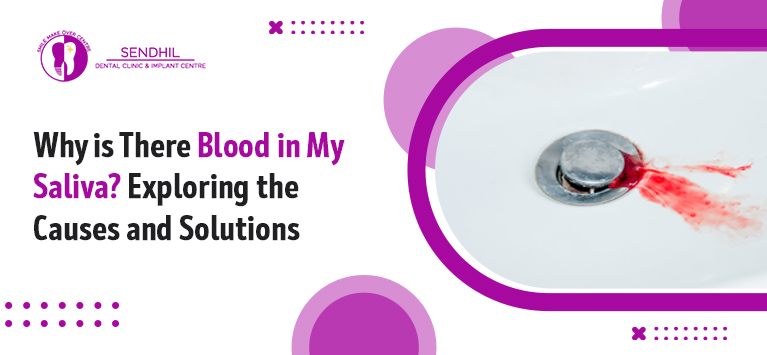
Why is There Blood in My Saliva?
Finding blood when you’re expecting saliva is pretty unnerving, right? Well, the likely troublemaker is gum disease. It’s a usual suspect causing this hiccup. Now, fixing it is a game of detective – you’ve got to figure out what’s causing the oral bleeding. This is where teaming up with your dentist becomes your superhero move. Together, you’ll hatch a plan to supercharge your oral hygiene. Regular check-ups and expert advice become your trusty sidekicks, not just for the current hiccup but for a long-lasting smile. Dive into the cause, treat it, and voila – confidence is restored, and your gums and teeth are all set for a healthier future!
In this blog post, we’ll explore the causes of blood in saliva. We will also provide some tips that can help you manage this condition.
Table of Contents
What Causes Blood in Spit?
Gum disease is the most common cause of blood in spit up. You may experience blood in saliva when you brush your teeth. It can happen because you may be suffering from gingivitis – a common gum infection. This illness is the earliest stage of gum disease and can be easily treated if caught early. But it can advance to periodontitis, an irreversible form of the disease that may require surgery.
Other Dental Causes of Blood in Spit Up Include:
- It can be the case that you’ve had a tooth extracted. After the procedure, a small amount of blood may be present in your saliva. However, it should clear up within a day or so.
- Blood in saliva may also be a symptom of oral cancer. It is a less common cause of blood in spit up in most cases. Still, you should seek professional medical attention if you have other symptoms. A hard lump in your mouth, difficulty in swallowing or chewing, or changes to your voice can be the signs.
Non-dental Causes of Blood Spit Up Include:
- A chronic or severe nasal infection can lead to bleeding in the salivary glands.
- In rare cases, a tumor or growth in the mouth or throat can be the cause of your bleeding.
- Certain blood clotting disorders can be the reason for spontaneous bleeding in the mouth.
- Some medications, such as blood thinners or anti-inflammatory drugs, may result in bleeding.
- You can blame certain salivary gland diseases, such as sialolithiasis, for bleeding in the mouth.
Spotting Signs Other Than Bleeding
Between the aftermath of tooth extraction and the seriousness of blood in saliva, we will pause to recognize additional symptoms. It’s essential to grasp these indicators for a comprehensive understanding of your oral health. Here they are:
Persistent Bad Breath
Lingering bad breath, despite oral hygiene efforts, may indicate underlying dental issues. It’s crucial to address the root cause for lasting freshness.
Loose Teeth
If your teeth feel loose or shift unexpectedly, it could signify gum disease or other oral health concerns. Early action is essential for avoiding future issues.
Receding Gums
Gums pulling away from teeth may indicate gum disease or inadequate oral care. Regular dental check-ups and proper oral hygiene help in addressing and preventing gum recession.
Swollen or Tender Gums
Swelling or tenderness in the gums might be a sign of inflammation, often associated with gum disease. Regular check-ups and proper oral care can alleviate swollen gum symptoms.
Changes in Tooth Sensitivity
Unexplained changes in tooth sensitivity, such as increased pain or discomfort, could be linked to dental issues. Monitoring and reporting these changes to your dentist is vital for proactive care.
Understanding these symptoms beyond bleeding is essential for a comprehensive grasp of your oral health. If you notice any of these signs, immediately consulting your dentist can contribute to effective diagnosis and treatment.
Is Blood in Saliva Serious?
The good news is that most cases of blood and saliva are not serious. Or even if there is something more serious, such as oral cancer, consult a dentist immediately. The earlier it’s diagnosed, the better your chances of successfully treating it.
Experiencing sudden, unexplained bleeding in your mouth that doesn’t clear up on its own? You should consult your dentist or doctor for an evaluation. They’ll be able to examine the affected areas of your mouth. And they can easily help you know the underlying cause of the blood in spit up.
How to Treat Blood in Saliva Issue?
If there blood in spit up, it’s less likely to be concerning if you know the possible reasons. On the basis of that, you can have a prevention plan. Rely on your dentist to give you the best information. Till then, these tips will work to promote better health.
- Brush your teeth using fluoride toothpaste two times a day.
- Floss your teeth once a day.
- Use an antiseptic mouthwash.
- Clean your tongue with a tongue scraper.
- Drink plenty of water and eat a well-balanced and healthy diet.
- Quit smoking and avoid other tobacco products.
- Limiting alcohol and sugar intake.
- Visit a dentist at regular intervals for routine checkups and cleanings.
Do these things. By this, you can help prevent blood from showing up in your saliva. It will help you in promoting healthy teeth and gums.
Treatment Options for Blood in Saliva
- The treatment for the blood in spit up illness will depend on the underlying cause. Your dentist will work with you to develop a proper and effective plan for you.
- Feeling like gum disease is the underlying cause? No issue! Your dentist may recommend a deep cleaning of the teeth and gums. This process involves removing plaque and tartar from below your gum line. A periodontist may perform surgery to repair the damage in more severe cases.
- If your blood in saliva is caused by oral cancer, your dentist may recommend more aggressive treatments. They can involve chemotherapy and radiation.
Conclusion
You can have blood in spit up due to several factors. But in most cases, the cause is gingivitis or gum disease. See your dentist for a diagnosis if you experience continuous or unexplained bleeding in your mouth. Follow good oral hygiene practices and, along with that, work with your dentist. They will address any underlying health issues. It will help prevent blood in saliva and maintain healthy teeth and gums.




